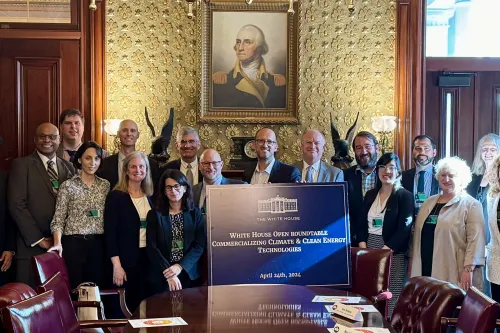Representative Term Sheet for Launching Life Science Startups
Beginning in Spring 2020, a consortium of academic institutions, VC's and law firms created a “representative” term sheet that an investor and an academic institution might use to begin discussions around launching a life science startup. The objective was to create a reasonable approach, with terms and clauses that most parties could use in most situations. The philosophical underpinnings can be found here: “Term Sheet Recommendations for Launching University Life Science Startups” and “Recommended Process Improvements for Launching University Life Science Startups”, initially released in December 2020. Since that time, the creators have embodied those principles into this non-binding term sheet template, with representative clauses, which can be downloaded and used freely by any parties that wish to do so. Through these efforts, we hope to significantly reduce the time spent negotiating these deals across the whole early-stage life science industry, which could lead to therapeutics, diagnostics, and medical devices reaching the market months or years earlier, with the resulting benefit to patients worldwide. The latest version of the document itself can be downloaded from the Association of University Technology Managers (AUTM - Word and PDF) and the National Venture Capital Association (NVCA - Word).
One important note: we say “representative” above because the great majority of the terms herein would be considered reasonable by parties on both sides, and hence we anticipate that in many situations this term sheet could be used without significant further edits. However, it should be noted that any given institution or investor may have certain preferred approaches or policies about which they may feel strongly. For instance, some institutions have strong feelings in particular around sublicensing income, reservation of rights, or access to future improvements. And some investors have equally strong feelings about equity, success fees or board observer seats. Unfortunately, it would have been impossible to create a single document which incorporated all variations. Accordingly, some of the contributing entities, and other parties as well, may need to use alternative approaches to those in the term sheet template, even if they have approved the general approach espoused herein. Hence, nothing in these documents should be seen as binding any of the undersigned, but rather as a reasonable approach overall for most situations. In that spirit, we hope you find this term sheet useful. Over the next few months, we hope to release a full license agreement template, based on this term sheet. If you have any questions, comments or concerns, or would like to have your institution added to the “Endorsed By” line, please email techtransferVCstartups@gmail.com.
Best wishes, from the creators of this document (contact person with their entity in parentheses):
- Academic institutions: Orin Herskowitz, Ofra Weinberger, Melissa Cohen (Columbia), Robin Rasor (Duke), Isaac Kohlberg (Harvard), Steve Kousouris (Johns Hopkins), Lauren Foster (MIT), Karin Immergluck (Stanford), Teri Willey (Indiana University), Rick Brandon (University of Michigan), Ian McClure (University of Kentucky), John Swartley (University of Pennsylvania), and Jon Soderstrom (Yale)
- Venture capital firms: Galya Blachman, Jessica Alfano and Deb Palestrant (5AM Ventures), Kevin Bitterman (Atlas), Deirdre Cunnane(Omega Funds), Kirsten Leute and Bill Harrington (Osage University Partners), Amy Schulman and Alexandra Cantley (Polaris), Sarah Reed, Nadim Shohdy and Josh Resnick (RA Capital), and Cami Samuels (Venrock)
- Law firms: Geoff Spolyar (Cooley), Sarah Solomon (Goodwin), and Kathy Ku (Wilson Sonsini)
For more information about the process, view the BioCentury article https://www.biocentury.com/article/645701.
Subscribe to our newsletter
Stay updated with the latest insights and events with our quarterly newsletter.


